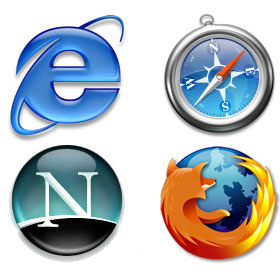 In the same way that NOT everybody speaks the same language, NOT all Internet users use the browser. Many hotels have websites that only speak one language: Internet Explorer, the language of most like English, but it’s just one language at the end of the day. There are other languages, the same way there are other browsers: Make sure that your website also supports those other browsers.
In the same way that NOT everybody speaks the same language, NOT all Internet users use the browser. Many hotels have websites that only speak one language: Internet Explorer, the language of most like English, but it’s just one language at the end of the day. There are other languages, the same way there are other browsers: Make sure that your website also supports those other browsers.
If a client calls and you answer “#%&)= % y/&$! *:@$%?”, what do you think he will do? Of course, the client will hang up immediately and call the next hotel on the list while he is looking for a hotel for his holiday.
This, which seems very obvious, is happening constantly on the online world. In fact it happens in many hotels and other businesses with one out of every 5 clients.
From the information obtained through visits to our website www.HotelSearch.com, these are the languages that our online clients speak.
Most of our users (81%) are still using Internet Explorer as a browser. But an important and increasing amount are using other browsers like the popular Firefox (15%).
Discriminating against the 20% of users who don’t use Internet Explorer would be a very serious mistake. However, it’s something that many companies still do nowadays, among them many hotels and hotel chains. Are you sure this is not happening with your website?
With Firefox, you can’t see very well, for instance, hotel Ibiza Rooms, or Castellar
But this bad habit of designing web pages only for Internet Explorer is not just something unique to the hotel sector, this happens in all industries and some big companies, such as Renfe (the Spanish national train network), also have this problem. In the case of Renfe a user that is trying to find a ticket may encounter some problems. As you can read in its general conditions of use: “This Portal has been designed mainly to work with Internet Explorer, hence Renfe is not liable for any problem Users may encounter if they use other browsers.”
The main point here is that the trend to use different browsers and not Internet Explores is clearly growing. As per the data published in Wikipedia issued by the agency TheCounter.com, the use of Internet Explorer has gone down from 90% in January of 2006 to 76,3% in September 2008.
Here in Mirai we think that given the importance of your website as your window to the world and the place where most of your sales should be made, it is essential that this website speaks as many languages as possible and not just English. Designing websites that are compatible with 99% of the browsers isn’t difficult or expensive. It just requires a bit more testing and checking and a bit more of your designers’ team’s time, or even yours if you are designing your own website. In any case, it turns out to be much cheaper than having a person who speaks 5 languages in your hotel’s reception.
We would recommend that you have several browsers installed in your computer and that you use them regularly to check your website. If you want to try, you can download them from the following addresses and install them in your computer, they’re all free.
Mozilla Firefox – http://www.mozilla.com/en-US/
Opera – http://www.opera.com/
Safari for Windows – http://www.apple.com/safari/download/
Google Chrome – http://www.google.com/chrome/



